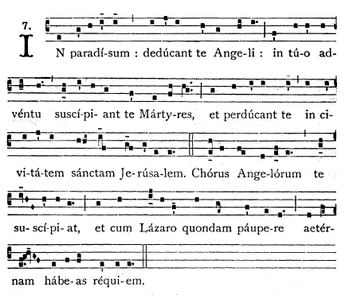Music for the Feast
Scroll below for links to the songs.

Belloc's lovely novel, while full of light-hearted fun and richly humorous and joyful, does at times sound a knell of memento mori fitting to the time of year in which the novel is set. Indeed, the "Feast" itself takes place on the Solemnity of All Saints and upon the Vigil of the Feast of All Souls.
Around the time of Halloween and the beginning of November, it is fitting to remember those who have gone before us in the final journey, the final trip to rediscover our true homeland. In fact, the entire month of November is dedicated to the remembrance of the dead, the poor souls of the Church Suffering in Purgatory.
One might even argue that this theme of passing and death is the very central motif and reflection of the book, as tellingly indicated by Belloc's foreword:
Around the time of Halloween and the beginning of November, it is fitting to remember those who have gone before us in the final journey, the final trip to rediscover our true homeland. In fact, the entire month of November is dedicated to the remembrance of the dead, the poor souls of the Church Suffering in Purgatory.
One might even argue that this theme of passing and death is the very central motif and reflection of the book, as tellingly indicated by Belloc's foreword:
As a man will paint with a peculiar passion a face which he is only permitted to see for a little time, so will one passionately set down one's own horizon and one's fields before they are forgotten and have become a different thing. Therefore it is that I have put down in writing what happened to me now so many years ago, when I met first one man and then another, and we four bound ourselves together and walked through all your land, Sussex, from end to end. For many years I have meant to write it down and have not; nor would I write it down now, or issue this book at all, Sussex, did I not know that you, who must like all created things decay, might with the rest of us be very near your ending. For I know very well in my mind that a day will come when the holy place shall perish and all the people of it and never more be what they were. But before that day comes, Sussex, may your earth cover me, and may some loud-voiced priest from Arundel, or Grinstead, or Crawley, or Storrington, but best of all from home, have sung Do Mi Fa Sol above my bones.
|
|
As you will find below on this page, Belloc knew a thing or two about music. He knew, for example, that during the Medieval period a practice arose for the teaching of Gregorian chant which became known as solmisatio. Solmisatio consisted of the use of syllables representing notes on the tonal scale - which eventually became the Do Re Mi Fa Sol La Ti Do that everyone knows so well (especially from The Sound of Music). In fact, solmisatio's first two syllables are the "Sol" and "Mi" of this syllabic scale.
But Belloc here had one particular Gregorian chant in mind: the In Paradisum, traditionally sung at Requiems and on the Feast of All Souls, to memorialize the dead. It is given here below, and translated. |
So at your Four Men Feast, make sure you raise a glass - and your voice - in this special prayer for angelic and saintly assistance to the dead and dying in their final journey to the home of which Belloc's home Sussex - and your home and my home too - are but faint images, and where the Feast continues without end.
And now the rest of the music!
|
Grizzlebeard: "If your song is one upon the divinities, it will not go with ale and with wine, nor with the character of an inn."
Sailor: "Do not be so sure. Wait until you have heard it. For this song that I am proposing to sing is of a good loud roaring sort, but none the less it deals with the ultimate things, and you must know that it is far more than one thousand years old. Now it cannot be properly sung unless the semi-chorus (which I will indicate by raising my hands) is sung loudly by all of you together, nor unless the chorus is bellowed by the lot of you for dear life's sake, until the windows rattle and the populace rise. Such is the nature of the song." |




